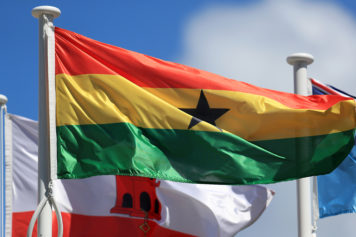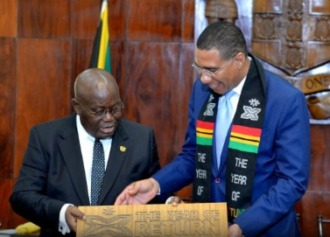As a 12-year-old girl emigrating to America from Ghana, Sandra Appiah (pictured) certainly could have been a victim of U.S. prejudice against foreigners.
And when she began high school, such attacks did come her way. But not from whom one might expect. “A lot of the comments I was receiving were from African-Americans, or a lot of the discrimination [came] from African Americans,” the 23-year-old noted about her teenage years in the Bronx.
“Every time we did something wrong, it was, ‘Oh, go back to Africa,’ or, ‘Oh, go back to the jungle.’ ‘You’re an African booty scratcher,’ or, ‘You stink,’ or, ‘You live in trees,’ or things like that. I had no idea where these ideas were coming from, because I remember in Africa I was a very happy child growing up.”
Eventually, Appiah discovered the reason for all the animosity from people who looked like her. “CNN, PBS, all these documentaries, this is how they portray Africa,” Appiah says. “So in their [African-Americans’] mind-set, this is the only way they know Africa to be.”
Rather than just accept this, though, Appiah knew she had to take action, co-founding a company called “Face 2 Face Africa” in March 2011.
A month later, Face 2 Face Africa Magazine (F2FA) was born online, with the mission of “restoring Africa’s image within the global community.” Appiah’s role as F2FA’s editor-in-chief/chief operations director gives her the perfect forum to improve relations between all people with African lineage, while placing the continent under a bright and progressive spotlight.
“Unless we change that perception and we present another side of Africa, that will constantly be the way that Africa is viewed,” the Syracuse University graduate says. “We felt that there’s a need for a platform that will bridge the gap, that will remind us of our common ancestry,” and that blacks, no matter where they live, are “all people of African descent.”
But she hasn’t been able to get far in that mission without some help.
Enter business partner and fellow Ghanaian Issac Boateng, 28. In 2008, the two formed a business relationship bonded by their symmetrical upbringings, laying conceptual groundwork for what would become F2FA years later.
“Sandra was working on a project, a film project, and I’m kind of known within the African community as the go-to person for different print production,” Boateng recalls. “She wanted me to assist her in terms of being published for that particular film project. When we met, we touched on our childhood experience being very similar. We saw what the need for having this sort of platform was.
“We started talking about it. We wanted to make sure everything was right before we actually went forward. From 2008 up until 2011 was the strategic planning process: how to implement it, how to execute it, trying to figure out how we can come together and really help change the image of Africa due to our very similar upbringing in the Bronx.”
Boateng believes the stereotypes some African-Americans have about Africans is due to their educational background. He came to this realization after having attended Lincoln University, an HBCU, years ago.
“The students were eager to learn about Africa, to learn about where the roots are, and how they can be connected, so I saw the difference from going from middle school to high school and transitioning to college. [There was a] huge difference [in] African-Americans wanting to learn about their roots”…
Read More: goodblacknews.org


